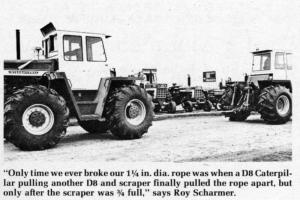1978 - Volume #2, Issue #2, Page #11
[ Sample Stories From This Issue | List of All Stories In This Issue | Print this story
| Read this issue]
Nylon Tow Ropes Catching On Fast
 |
"So far as we know, the only time our 11/4 in. 'dia. nylon rope broke was when a D-8 Caterpillar pulling another D-8 and scraper finally was able to deliberately pull the rope apart - but only after the scraper was almost full," says Roy Scharmer, manufacturer of Scharmer nylon tow ropes at Buffalo Lake, Minn.
Scharmer specializes in producing top quality nylon ropes and warns that "a few fly-by-nighters got into the business and sold poor quality nylon rope at cut-rate prices. In some cases, metal hooks and chains used at the ends of the rope were of inferior quality. It's extremely important to use quality materials since serious accidents can result if the metal hook, chain or clevis at either end breaks under heavy load. Be sure the hooks or thimbles on the ends are strong enough for whatever you are towing because of the stretch in nylon, and its tremendous strength. It works much like a rubber band, if the ends should break. If the rope itself should break, there is very little snap back," Scharmer points out.
His firm offers about 2 dozen different sizes of "cut-length" nylon tow rope ranging in diameter from % to 2 in. List prices vary, depending on size and the type of chain, hook or clevis on the ends. The largest 2 in. dia. rope, rated at 92,000 lbs. pulling strength, sells for.$6.40 per ft., plus $36.20 for each end thimble made of high quality steel. A 25 ft. length of 11/4 in. dia. nylon rope, with a thimble at each end, weighs 121/4 lbs. and retails for $81.60.
"Nylon tow ropes work great for pulling one tractor with another to get through muddy fields," says Earl Langfitt, of New Hampton, Mo., one of the original manufacturers of nylon tow ropes. "We sold a lot of tow ropes last fall for dual tractor hookups, and for pulling equipment out of mud holes." Langfitt notes that 1/z in. log chain has a breaking strength of about 14,500 lbs. This compares with 14,200 lbs. for stan
dard 3/4 in. dia. nylon rope, 25,0001bs0 for 1 in. nylon rope, 37,500 for 11/4 in.,
53,000 lbs. for 11 in. and a breaking strength of 92,000 lbs. for 2 in. dia. nylon rope. "A 20 ft. length of top quality 1/z in. steel chain costs about $100, compared with $113 for our 2 in. nylon rope which has mo're than 6 times as much breaking strength. Our 11/4 infl nylon rope, with 2% times as much strength, costs about half as much ($53.30) as 20 ft. of 1/z in. steel chain. It is necessary to have higher break strength with nylon tow rope because the user can apply greater pulling power by running into it, and the fact that it will stretch 35%."
Langfitt notes that running nylon rope to the end and applying a continuous pull can cause the rope to lose its spring or stretch: "When all the stretch is applied, the pulling unit should be locked down and held, allowing built-in stretch to do the pulling without applying a continuous pull on the rope." He warns that if hooks are attached to the nylon rope, be sure their strength exceeds that of the rope itself. Instead of a clevis - particularly on heavier 11/4 in. dia. or larger nylon rope - he recommends using a shackle which is similar to a clevis but stronger.
For more information on nylon tow ropes, contact: FARM SHOW Followup, Scharmer Mfg., Buffalo Lake, Minn. (ph. 612-833-5913).
FARM SHOW Followup, Earl and Ron Langfitt, New Hampton, Mo. 64424 (ph. 816 439-4235).

Click here to download page story appeared in.

Click here to read entire issue
To read the rest of this story, download this issue below or click here to register with your account number.




